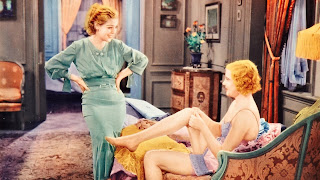This is a neatly done film - tight and enjoyable (69 minutes in total), with characters that you really end up liking. Even those people you think are the most heinous turn out to have streaks of goodness in them. Though a pre-code, most of the naughtiness is Dixie Dare (Una Merkel) in her slip and doing cartwheels that are perhaps a bit immodest.
The film, like many pre-codes, operates a lot on innuendo. We THINK our heroine Marion, may be having a relationship with Jimmy, but she isn't. Later, we think she might be about to bed Ford Humphries (Louis Calhern), but she doesn't. Marion is very much an innocent who spends the film learning to become stronger with adversity. Ms. Young does a good job of portraying that naivety, along with giving the character a strong backbone - this is a young woman who bounces with the punches, and is not afraid to stand up for herself.
There is one other piece of suggestion present in the film. Marion's mother (Nella Walker) is openly hostile to her child from the moment we encounter her. Later, we discover that Mrs. Hollister is not Marion's birth mother; Marion's mother was a showgirl, and Marion is illegitimate. Interestingly, though a religious man, Mr. Hollister is (Joe Cawthorne) is kinder to the girl. We also learn that he asked his wife to take in the orphan child - according to him, an act of "christian charity." Is it possible he is Marion's natural father? The film doesn't tell us the answer, but we left it wondering just WHY he was so eager to adopt the girl. It certainly isn't because his wife wants children.
The men in the film are secondary to Ms. Young; they are moths to her flame. David Manners is the titular leading man. He had recently appeared in both Dracula (1931) and A Bill of Divorcement (1932) (TCM article). Regardless, the character keeps disappearing from the action, and we don't really miss him. George Brent (Dr. Tony Travers) is also absent for a lot of the film; again, the viewer doesn't really care. Louis Calhern, however, is a lot more interesting as a roué; when he is on screen, you pay attention. Mr. Calhern started his film career in 1921, and on Broadway in 1923, appearing in 28 plays over the course of his lifetime, including The Magnificent Yankee in 1948 (a role he would reprise on film in 1950) and King Lear. With his splendid voice, he was made for talking films, and his career as a supporting player would expand in 1931. Often he was the villain (as in our film), or the boss (Notorious (1946)). He ventured into the realm of the musical when Frank Morgan died in 1949, taking on the part of Buffalo Bill Cody in Annie Get Your Gun (1950). Mr. Calhern was in Japan for Teahouse of the August Moon (1956) when he suffered a heart attack and died. He was replaced by Paul Ford, and his scenes were reshot, making his last film (another musical) High Society.
The supporting female characters are more interesting then the men. Helen Vinson is rather underused as Enid, but she's always excellent. The star turn in the film, though, is Una Merkel as the effervescent Dixie Day. She's delightfully funny, and her little cartwheels add that little bit of pizazz (or "ginger" as Warner Brothers phrased in the TCM article above) that one expects in a pre-code . Ms. Merkel is always an actress to look forward to seeing - this film is no exception.

The gowns by Orry-Kelly are quite lovely, and we were impressed by the set design of Jack Okey. The scenes of Penn Station are splendid, and for us, a piece of nostalgia. Demolished in 1963 (a controversial action at the time, and long bemoaned by New Yorkers - to quote architectural historian Vincent Scully "One entered the city like a God [now] One scuttles in now like a rat."), the building was a wonder of height and light. Mr. Okey used a combination of stock shots and sets to paint the picture of the station.
We'll leave you with the film opening and the suggestion that you give this one a viewing.











